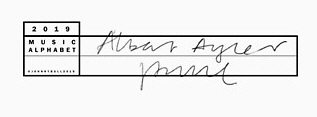|
Music Is The Healing Force Of The Universe The Inconsistency of |
|
|
||||||||||||||||
|
May 1 2020
1. Henry Grimes (3/11/1935 - 15/4/2020) |
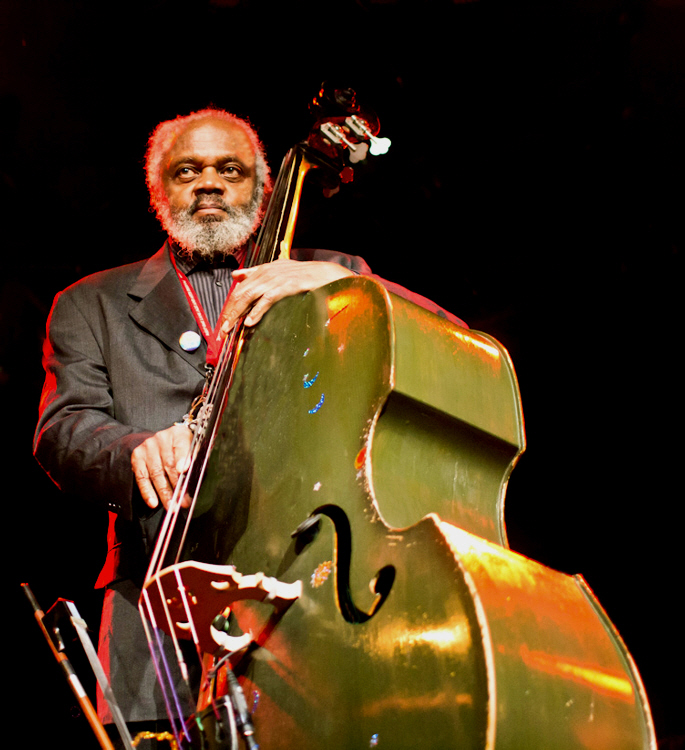 |
|||
|
(Photo by Peter Gannushkin, 2011)
Very sad to report the death, from COVID-19, of Henry Grimes, at the age of 84. I think everyone knows the story of Henry Grimes’ interrupted career. A glance at his remarkable discography, recording with a whole host of jazz legends, alongside most of the avant-garde of the 60s, reveals the gap. Henry Grimes played bass on six Ayler LPs (Spirits, Swing Low Sweet Spiritual, Spirits Rejoice, Sonny’s Time Now, In Greenwich Village and The Village Concerts) and following that session at the Village Vanguard on 18th December, 1966, which produced tracks for the last two, after nearly ten years of consistent recording, there’s nothing for 37 years, until February, 2003. Henry Grimes had moved to the West Coast and had disappeared. For a long while he was missing, presumed dead, until Marshall Marrotte found him. Then, with the help of Margaret Davis, and William Parker (who gave him a bass) Henry Grimes’ musical career began again. The same story is repeated in all the obituaries (and, if memory serves, there’s my contemporaneous account down among the Archives) but that’s a tale of a void, it should not obscure what lies either side of it, the music. There’s an obituary on WBGO, which includes a clip from Jazz on a Summer’s Day, where there’s a shot of Henry playing bass with Thelonious Monk. And on the Wire site, there’s an appreciation of Henry Grimes by William Parker, and be sure to read the comment from Henry’s wife, Margaret Davis Grimes. * 2. Giuseppi Logan (22/5/1935 - 17/4/2020) |
|||
 |
|||
|
It would be churlish to keep to the rules and not mention another victim of COVID-19, whose career in jazz merely glided alongside that of the Ayler brothers but did not coincide in a recording context. Like Henry Grimes, Giuseppi Logan was also 84 and another victim of COVID-19. His career was not as wide-ranging as that of Henry Grimes, but there was the coincidence of a lengthy disappearance from the music scene, and then a late rediscovery. Pierre Crépon has written an obituary for The Wire, and there’s also a piece by Matt Lavelle, who did a lot to secure Logan’s comeback. There are also obituaries at the New York Post and WBGO, and I took the above photo from the Giuseppi Logan page at Alchetron. As for the tenuous links to Albert Ayler: Giuseppi Logan’s debut LP on ESP was among the first batch of free jazz releases on that label. In fact there’s the double review in Down Beat, of 15th July, 1965, where Logan’s debut is reviewed alongside Byron Allen’s and Spiritual Unity, first by Kenny Dorham (one star for the Allen, no stars for the other two) and Bill Mathieu (no ratings given). In the same edition there’s also a review of a concert featuring the three groups which took place at the Town Hall, New York on 1st May, 1965 - the concert when Bells was recorded. * 3. Lee Konitz (13/10/1927 - 15/4/2020) Another victim of the virus, Lee Konitz was 92 when he died. His career is well-documented and there are many obituaries online, so I’ll just mention John Fordham’s in The Guardian. As far as I know there are no links between Lee Konitz and Albert Ayler, so this is more of a personal mention. Back in the black and white days (see below) when information about jazz was hard to come by, there was a TV programme on the BBC called Jazz 625 - most episodes criminally wiped - one of which featured Lee Konitz. It was recorded in 1966, so I would have been 15 when I saw it, and I can still conjure up a picture from it in my mind’s eye. Konitz was literally there at The Birth of the Cool, and also, it should always be remembered, part of the Lennie Tristano group which recorded the first two pieces of Free Jazz (‘Intuition’ and ‘Digression’) in 1949, no less, when the newest thing was bebop. Perhaps a musical cul-de-sac at the time, but, even so ... * The Smithsonian Jazz Oral History Program When I was looking around for Lee Konitz items I came across this: The Smithsonian Jazz Oral History Program. I’m not suggesting it’s new - far from it - just that I found it by accident and maybe other people don’t know about it. Transcripts in pdf format and mp3 clips of interviews with numerous jazz musicians. Great if you’ve got some time on your hands. * Don Ayler on Alto Kees Hazevoet kindly sent me a translation of a review in Jazzwereld 22, February, 1969 of a Don Ayler concert at Slugs’ in New York, which is probably the one mentioned in the Holy Ghost book as happening on 21st September, 1968. It’s interesting since Don is playing alto saxophone (confirming the story that he started out on that instrument before switching to trumpet), and Albert makes an appearance on bagpipes. Here’s the translation from Kees, and the original page is available here. ‘Jazz in New York By Frens van der Mei Don Ayler on alto Don Ayler played on a Saturday afternoon [in Slugs]. That’s when people play, who club owners don’t dare to hire for a whole week. Unfortunately the organization was completely lost. Half the group didn’t show up, so I couldn’t hear the music that I had been wanting to hear for quite some time. I couldn’t verify the many stories about a fantastic new pianist and bass-clarinetist. Rashied’s brother, Mohammed Ali, was the drummer and he is just as fierce as his brother, just as energetic, in the category of exciting drummers, very super fast with the hands. Don played his piercing trumpet and I must say that it didn’t have much form. He also plays alto now and sounds like a derivative of his brother. Since the Holy Ghost book cited the Village Voice of 19th September as confirmation - presumably an advert - I had a look at the Village Voice archives on google but there’s nothing for 1968. However, I did come across the following advert for Don Ayler’s Town Hall concert of 11th January, 1969, at which the two revelatory tracks on Disc 7 of Holy Ghost were recorded. |
|||
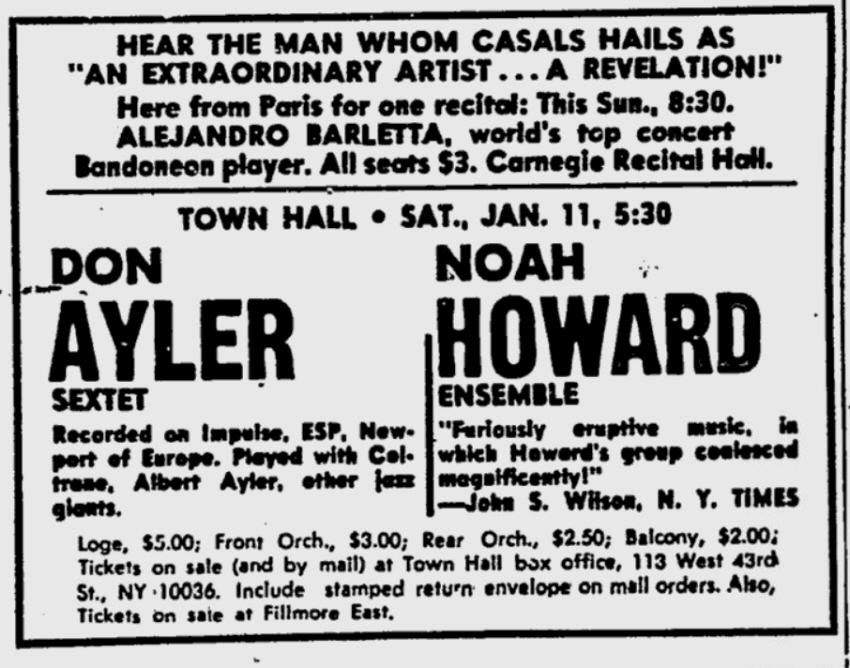 |
|
Notes from the Groves of Academe A couple of things: ‘Listening at the Edges: Aural Experience and Affect in a New York Jazz Scene’ is a 2014 Ph.D. thesis by Matthew Somoroff, which, I must confess, I haven’t read, but I mention it here because in the third part (p. 275) of Chapter 5 (‘What We Talk About When We Talk About Listening: Negotiating Sociality in Moments of Listening’) which is an interview with musician, Patrick Brennan, there’s an in-depth discussion about the first track on Spiritual Unity, ‘Ghosts: First Variation’ (p. 284). I’ve said before, but it’s a good line so I’ll say it again, my attitude to this kind of dissection of the intricacies of music is akin to Donald Sutherland’s attitude to tanks in Kelly’s Heroes, but for those who delight in such things, this will fascinate. The other nosegay I grabbed while clumping my way through the aforesaid groves, brings us back to the grim present. Wayne State University in Detroit, Michigan, has been tracking the virus, and has adjusted its seminar programme accordingly: ‘The seminars, which are taught by faculty across campus from a wide range of departments, are the second half of the Honors College’s required first-year sequence. The college’s senior lecturers were instrumental both in developing the interdisciplinary framework for the seminars and in creating courses themselves, with original topics including “Gangs and Organized Crime,” “Race and Sports in the United States,” and “Doing Well and Doing Good?” Honors Senior Lecturer Beth Fowler, Ph.D., teaches two sections of “Pop Goes the World: Global Freedom Movements and U.S. Popular Culture.” “The students are incredibly engaged and prepared in each class and are able to discuss the arguments intelligently,” she said. “But we also have a great time listening to songs from different time frames and countries; watching video clips; and looking at art, discussing various interpretations, and linking those interpretations to political and social shifts.” Fowler offers some of her favorite moments so far: students tracking the “whitening” and “Britishization” of the Beatles through a series of performances, finding calls to political action in Motown singles, and describing the live album Albert Ayler in Greenwich Village as “the soundtrack to a horror movie” and “a heart attack in the woods.” One student even created a Spotify playlist of all the songs played in class.’ Exit, pursued by a bear. * |
|
Three from youtube One of the more intriguing bands in the Tributes and Versions sections is Aylers Angels. Their 1997 album, Frözen Hämmer vs. Äncient Äxe, shared with Fake Hand, is now available on youtube and their live version of ‘Ghosts’ comes in around the 19 minute mark. And here’s this month’s ‘Ghosts’ played by Kenichi Manabe:
|
|
Why not a red double-decker bus? There’s a new 3 CD set entitled Underground London – The Art Music and Free Jazz that Inspired a Cultural Revolution which contains one track by Albert Ayler, ‘Moanin’’ from The First Recordings Vol. 2. It is a rather eclectic selection and is available everywhere, but I took the following track list and blurb from Cherry Red Records. ‘In the mid-1960s, the rigid and colourless British way of life was irrevocably transformed by the emergence of the underground movement, a loose collective of young radicals who introduced new social, sexual and aesthetic perspectives. Operating out of the heart of London, their various activities, from the newspaper the International Times, to the psychedelic club UFO, promoted alternative lifestyles and values and sparked a cultural revolution.
DISC ONE 1. W.R.U – Ornette Coleman Quartet DISC TWO 1. 3 JESUS MARIA – Jimmy Giuffre DISC THREE 1. LOVE FOR SALE – Cecil Taylor Trio |
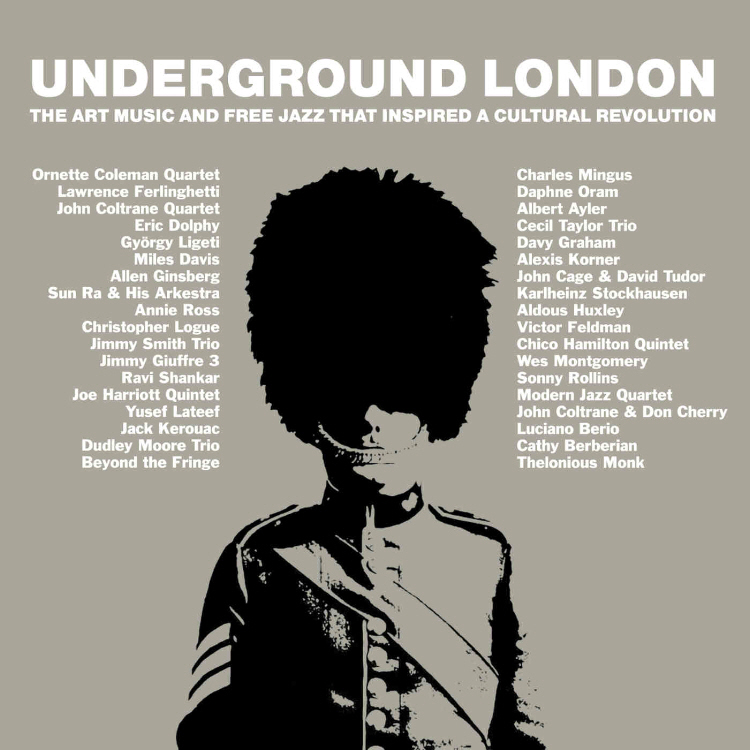 |
|
Actually, I could nitpick and point out that nobody in London in the mid-1960s was being inspired by Albert Ayler’s version of ‘Moanin’’ since Volume Two of The First Recordings was not available till much, much later. Besides which, I take exception to the phrase, “the rigid and colourless British way of life” - I used to like the world when it was all black and white. * And finally ... Since we seem to have moved into cheerier climes, here’s a selection of Ayler-related t-shirts which Dirk Goedeking sent me: |
|
|
||||||||||||||||||||||||||||||||||||
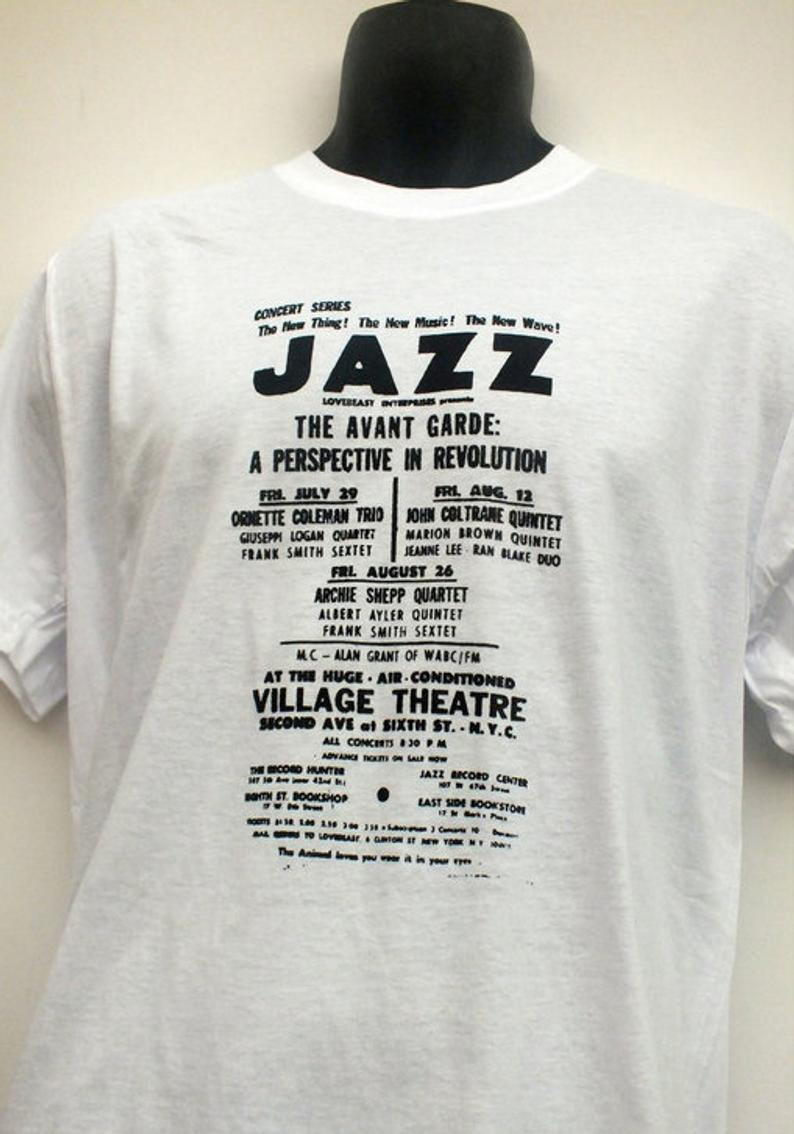 |
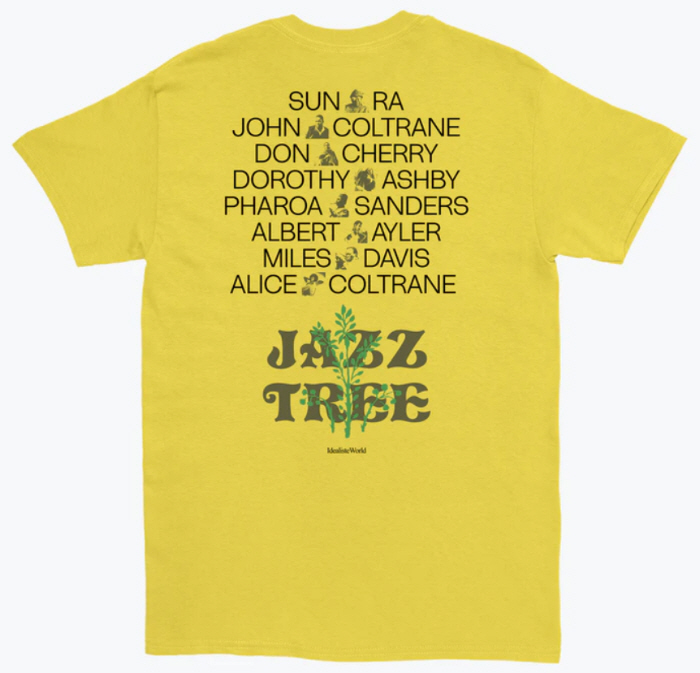 |
||
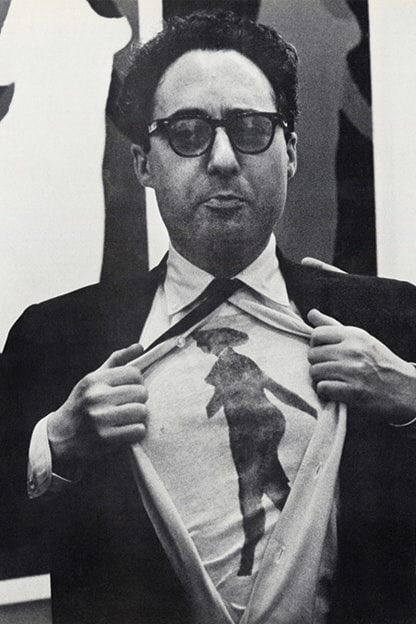 |
||
|
What’s New January - April 2020 is now in the Archives. ***
June 1 2020
Film footage from the Fondation Maeght I have to thank Steve Tintweiss for letting me know about this. The latest issue of the Fondation Maeght Newsletter has a short feature on Albert Ayler and the concerts of July, 1970. Amazingly, this includes a brief clip from the documentary film which was made at the time, directed by Jean-Michel Meurice. In fact, judging by the time stamp on the clip, this is a piece of unedited footage. This will take you to the Fondation Maeght Newsletter, or this will take you directly to the video. The history of Albert Ayler: Le Dernier Concert is a troubled one, often referred to in these pages, and apart from its early appearances at festivals, or on the F. M.’s own premises, the film has never been seen - never televised or made commercially available. Kasper Collin did include some excerpts in his 2005 documentary, My Name Is Albert Ayler (and as I write that I realise it’s now 15 years since that film first appeared and I suspect the fact that it. too, has remained without a DVD release is due to the same legal problem) and there are some screenshots on this site, but the fact that this looks like extra footage, raises the question: Is there any more??? Steve added the following description of the clip. ‘The Maeght Foundation has a new newsletter. The current issue #5 has a 2:33 excerpt from “Albert Ayler: Le Dernier Concert” by filmmaker Jean-Paul Meurice. Clip is from the first concert as a quartet on July 25, 1970 without Call Cobbs. It was just a few hours after we arrived. No rehearsal or sheet music prior. Mostly free Improvization for me as latest band member during this recitative version as spoken by Mary Maria Parks, in contrast to the sung finale two nights later after many encores. This first concert was kind of a rehearsal in front of the audience for me. (Clip corresponds to the opening track out chorus of “On the Riviera” (ESP-DISK’ CD) and the earlier bootleg “Quintet” CD. Allen Blairman is playing drums. I’m mostly playing arco while Albert lays down the riff after Mary’s poetic lyrics. Nice applause. Low level audio requires headphones or earbuds.’ * Back to the Village Theatre Kees Hazevoet kindly sent me a translation of a review from the Dutch magazine, Jazzwereld, of Ayler’s February 1967 concert at the Village Theatre (recorded and released by Impulse on In Greenwich Village and its companions). The original page is here, and this is the translation: ‘Jazz in New York By Frens van der Mei Ayler now also on alto Albert Ayler also gave a concert at the Village Theatre [earlier in the review, Van der Mei writes about an Ornette Coleman concert at the same premises; KH], with a group that varied from a quartet to an octet. The main part of the program was played by the by now well-known combination, brother Don, trumpet, Beaver Harris, drums, Michel Samson, violin, Bill Folwell, bass, to which bassist Alan Silva was added. Again the potpourri of catchy Ayler-tunes; there are always new ones and the old always sound different. As always, Ayler’s own solos, now also on alto, are the most striking. Properly speaking, only Michel Samson, and to a lesser degree also Harris, is a musical match for Ayler. Although brother Don can surely blow loud, he could at times be a bit more subtle, as his thinking is nearly always going in the same direction. When the group changed into a quartet (Ayler, the two bassists and Joel Freedman on cello), the music became more interesting. Ayler’s forte certainly isn’t overall conception and strong leadership and I found it surprising that the music of this combination showed to be more lively and better organized than with his usual group….but perhaps that was because we heard more Ayler. The last piece, with an octet, wasn’t very successful….it just didn’t fit well.’ (Translation: © Kees Hazevoet) * Further back to Stockholm Dirk Goedeking came across this: |
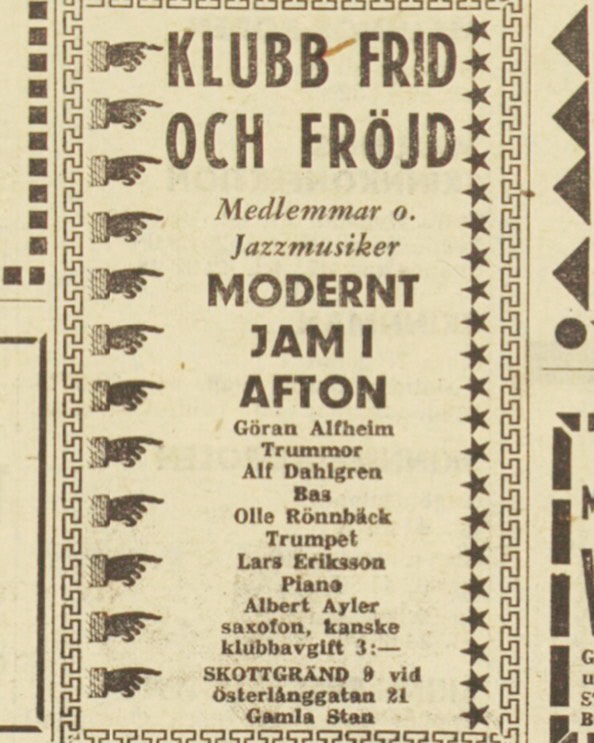 |
|||||||||||||||
|
From ‘frederiksbergrecords’ on Instagram, with the following comment: “Club Frid & Fröjd was one of the many jazz clubs that existed in the Old Town in Stockholm in the 60s and 70s. The film is a documentation of the club's 45th anniversary which was celebrated in 2006. It starts with a tour of some of the clubs that were then and ends in the room where Club Frid & Fröjd once was. Due to poor lighting conditions, the film is recorded in black and white.” No subtitles unfortunately, and Ceramic City Stompers style jazz - but it may be of interest to those who like to imagine Albert stripping the plaster from the walls.
|
|||||||||||||||
|
Allen Blairman Dragging things back to the Fondation Maeght, and while we’re in the vicinity of youtube and Albert Ayler’s bandmates, there are several recent videos of Allen Blairman (drummer at the F. M.) playing with tenor saxophonist, Olaf Schöborn. Here’s one.
|
|||||||||||||||
|
New Grass on Vinyl According to Pitchfork, Third Man Records have announced a new reissue of New Grass on vinyl, the first for this “divisive record in nearly 40 years”. The following is from the Third Man Records site: ‘Third Man Records is excited to announce their reissue of Albert Ayler's groundbreaking 1969 album New Grass, to be released on 180-gram vinyl on June 26. This will mark the first pressing of the album in nearly 40 years. Limited edition Coke bottle clear vinyl with opaque green wisps will be available at Third Man storefronts and select indie shops throughout the US. New Grass has been misunderstood from the day of its release. The album finds Ayler experimenting with soul music and digging back into his R&B roots (he started his career playing saxophone with Chicago bluesman Little Walter), fusing it with the avant-garde free jazz (the one element of the record which garnered consistent praise) and adding the vocals of Rose Marie McCoy, The Soul Singers and Ayler himself. As if predicting the divisiveness of the record to follow, Ayler speaks directly to the listener and explains that New Grass is nothing like his albums before – that it is of “a different dimension of his life” – in the album opener “Message from Albert.” New Grass deserves reconsideration, if not for the heavy grooves and surprising arrangements, then for its bravery in challenging norms of the time; by the ’60s, jazz was well-accepted as a uniquely American art form, while soul as a genre was very much still seen as primitive. Ayler melds them together and creates something novel, adventurous, and completely his own. At the time of its release, despite its divisive reception, New Grass helped break down the unnecessary walls dividing genres and revealed music’s potential freedoms. The album has gone on to influence generations of Jazz, R&B, Funk, Hip Hop, Post Punk, No Wave and unshrinking artists like Pharaoh Sanders, Alice Coltrane, Funkadelic, Jungle Brothers, Red Krayola, Sonic Youth and Mark E. Smith. Third Man Records can’t recommend this record highly enough. They are confident that it won’t take but one listen for you to understand New Grass is an undeniable healing force.’ |
|||||||||||||||
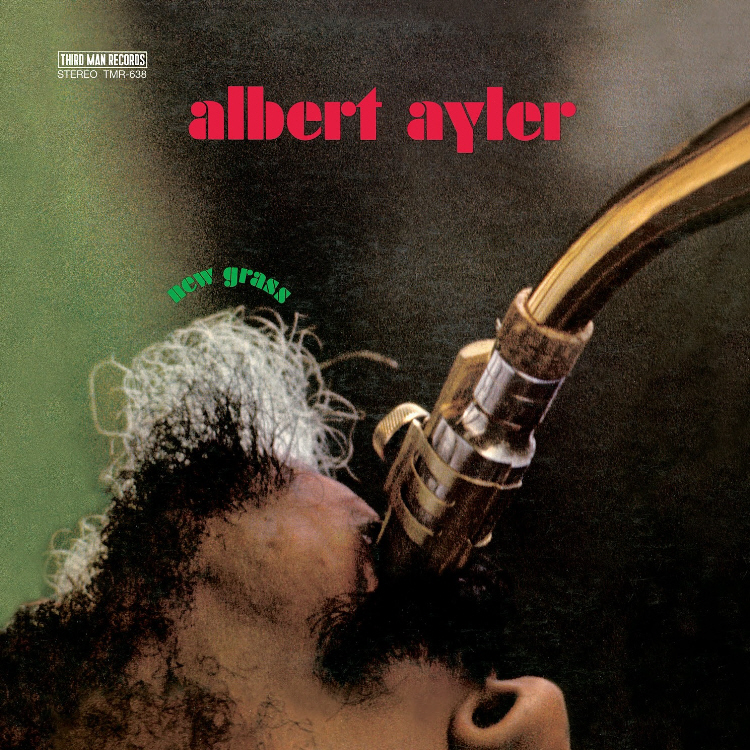 |
|||||||||||||||
|
I have to thank No. 2 son, Peter Regan, for letting me know about the above. This doesn’t mean that he’s joining the family firm, he was just surprised to find Albert Ayler mentioned in a news feed and thought he should tell me. Thanks Pete. * More matters discographical There’s a review of that 3 CD set of Underground London music which I mentioned last month on the PopMatters site. A new release, Oh Yeah?, from Ayler inspired group, Sunwatchers, reviewed on Pitchfork. A version of Leroy Jenkins’ tribute, ‘Albert Ayler (His Life Was Too Short)’ by Alexander Hawkins and Tomeka Reid on the album Shards and Constellations, reviewed on The Quietus. And, since we’re in the realm of tributes, I’ll give another mention to the Laurent Petitgirard album, Pop Instrumental de France, with its Ayler tribute track, ‘Albert Ayler In Memoriam’. I gave this a nod back in November, 2018, but then there was only a link to a dodgy Japanese site, which now seems to have removed the item. Now it’s available on youtube, complete with those authentic vinyl scratches which everyone loves. The Ayler track comes second, around the 3:50 mark. * And finally ... Spoilt for choice this month. Kees Hazevoet sent a link to a youtube clip, Science and Albert Ayler, which is old, and I may have mentioned before, but I can’t find it. And Dirk Goedeking sent this fake photo of Bill Clinton: |
|||||||||||||||
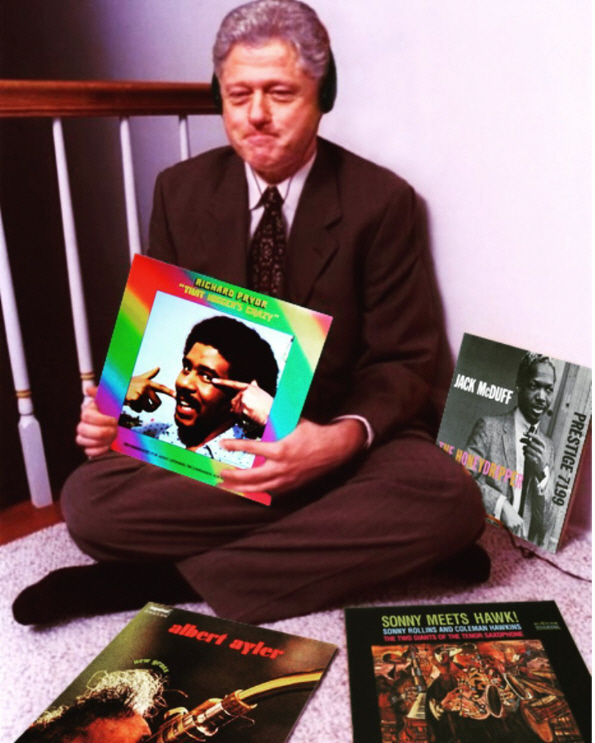 |
|||||||||||||||
|
But then, I came across this. ***
July 1 2020
‘New’ from Hat Hut Dirk Goedeking let me know about two upcoming Ayler releases from Hat Hut. |
|||||||||||||||
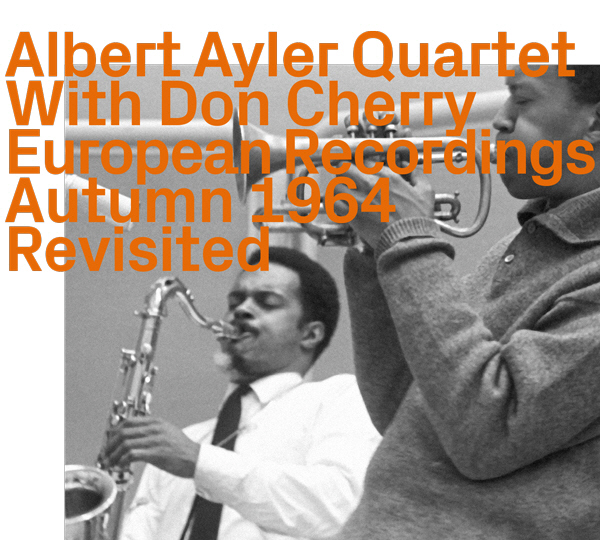 |
|||||||||||||||
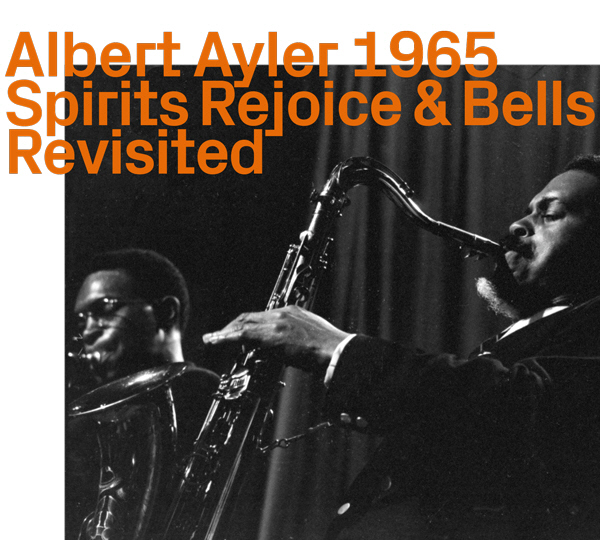 |
|||||||||||||||
|
No further information as yet, but presumably the 1964 CD is yet another repackaging of the Ayler/Cherry Quartet material, which Hat Hut have already released as Copenhagen Live 1964, European Radio Studio Recordings 1964 and Albert Ayler Quartets 1964 Spirits To Ghosts Revisited. But full marks to Hat Hut for twinning Bells with Spirits Rejoice. This makes far more sense than the ESP package of Bells with Prophecy since it combines the two original albums of the Ayler group which featured Charles Tyler on alto saxophone. * Stuff There’s a lot of stuff out there where Albert Ayler gets a glancing mention, particularly now when “Music Is The Healing Force Of The Universe” gets attached to any number of websites, blogs and articles (still, it’s better than drinking disinfectant). So here’s some of it: 1. The Quietus has a piece about Thurston Moore’s new album By The Fire, which includes the following: ‘“By The Fire is music in flames,” says a statement attributed to Moore and his Daydream Library Series label, which will release the album. “2020 is our time for radical change and collective awareness and Thurston Moore has written nine songs of enlightenment, released to a world on fire. Taking a cue from Albert Ayler’s ‘music is the healing force of the universe’, this recording offers songs as flames of rainbow energy, where the power of love becomes our call. These are love songs in a time where creativity is our dignity, our demonstration against the forces of oppression. By The Fire is a gathering, a party of peace—songs in the heat of the moment.”’ 2. European Echoes: Jazz Experimentalism in Germany 1950-1975 is a new book by Harald Kisiedu, reviewed on the London Jazz News site. I liked the following: “The detailed descriptions of the four main musicians discussed, Brötzmann, Schoof, Schlippenbach and Petrowsky, have fascinating similarities and differences. All four discovered American jazz partly through the broadcasts of Willis Conover on The Voice of America, and all four were initially attracted by the jazz of the 1950s, the hard bop of Horace Silver and Art Blakey in the case of Schlippenbach and Schoof, Lee Konitz and Paul Desmond in the case of Petrowsky, and, interestingly, Humphrey Lyttelton and Chris Barber in the case of Brötzmann. Apparently Brötzmann came with a friend to Birmingham in 1955 at the age of 14 and heard the bands of both Lyttelton and Barber and then heard Joe Harriott in London on the way back. All four then discovered the music of the ‘new thing’ in USA, especially that of Ornette Coleman, Cecil Taylor, Albert Ayler and late Coltrane and this became the major focus of their own music. They established strong links with the American scene and in time with other European scenes and played a key role in making free jazz and improvised music a vital part of worldwide contemporary music.” Humphrey Lyttelton and Chris Barber and Peter Brötzmann in the same sentence, never thought I’d see that. 3. ‘Goin’ Home’ as played by Albert Ayler on the Swing Low Sweet Spiritual LP (subsequently on the Goin’ Home CD reissue) or the second movement, the Largo, from Dvorak’s 9th Symphony (‘From the New World’) or, as most people in Britain know it, the music from the Hovis advert, is not an authentic spiritual. Who knew? Well, everybody who read the original article on the NPR site in 2018, which I just came across on the CPR (Colorado Public Radio) site: “How The ‘New World’ Symphony Introduced American Music To Itself”. Apparently the tune is Dvorak’s own and the words were added in 1922 by William Arms Fisher. [And, totally off the point, here’s my favourite string quartet, Dvorak’s No. 12, the American.] 4. There’s an article by Emily Gulbis about the Black Arts Movement on the Redbrick site. 5. An article/review by Gwen Ansell on the New Frame site features the music of Dudu Pukwana and the ‘Spears’, which again mentions Ayler in passing and why it cropped up in my regular end-of-the-month google search, but what caught my eye was the news that Keith Tippett had died on 14th June. Here’s the Guardian obituary. And then, just the other day I heard that Jacques Coursil had died on 26th June. Pierre Crépon has written an obituary for The Wire. As the man said: So it goes. * The Final Ghosts It was Steve Tintweiss who first let me know about the death of Jacques Coursil, and it was a reminder that this month is the fiftieth anniversary of Albert Ayler’s concerts at the Fondation Maeght. The brief snatch of video, mentioned last month, is still available, and, since youtube has gone a bit weird and I couldn’t find this month’s version of ‘Ghosts’, I thought I’d use Albert’s final recording of the tune. Recorded at the first concert at the Fondation Maeght, on 25th July, 1970 and available on Live On The Riviera, here’s the last * And finally . . . Since I’m dealing in batches, I thought I’d continue with the daft stuff. 1. Again, from Steve Tintweiss (who’s taken over Dirk Goedeking’s job of finding Ayler items in the retail sector) I give you, ‘The Ayler Lamp’: |
|||||||||||||||
 |
|||||||||||||||
|
Described on the Mezzo Collection site as follows: ‘CEILING LAMP AYLER I Getting as the inspiration the original saxophonist Albert Ayler, the Ayler ceiling lamp is the pure representation of the mid century essence. With a stylish design, the Ayler ceiling lamp will enhance the beauty of any room.’ And if that doesn’t go with the rest of your decor, there’s always the AYLER II. |
|||||||||||||||
 |
|||||||||||||||
|
2. Dirk found this on Chegg Study Textbook Solutions (Find solutions for your homework): |
|||||||||||||||
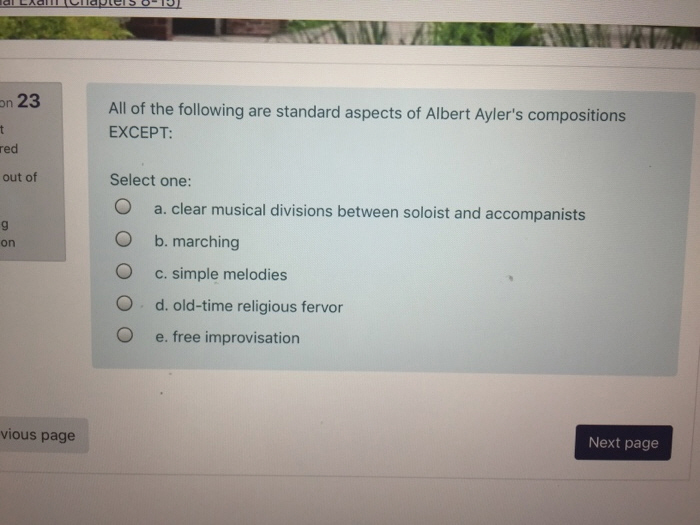 |
|||||||||||||||
|
3. And my contribution: I know this is a simple database glitch on the amazon site, but it’s not just the picture, it’s the Ł77.77 price tag as well. Hurry, only 3 left in stock! |
|||||||||||||||
 |
|
August 1 2020
Masterpiece No. 39 Love Cry has been released in Italy as No. 39 in Hachette’s Masterpiece series - I Capolavori Del Jazz In Vinile 39: Impulse A-9165. It’s the original vinyl version and comes with an 8 page booklet. The picture below is courtesy of the discogs site, and pictures of the booklet (just about readable if you magnify them a bit, and if you know Italian) are available on the Love Cry Covers page. |
||||||||||||||
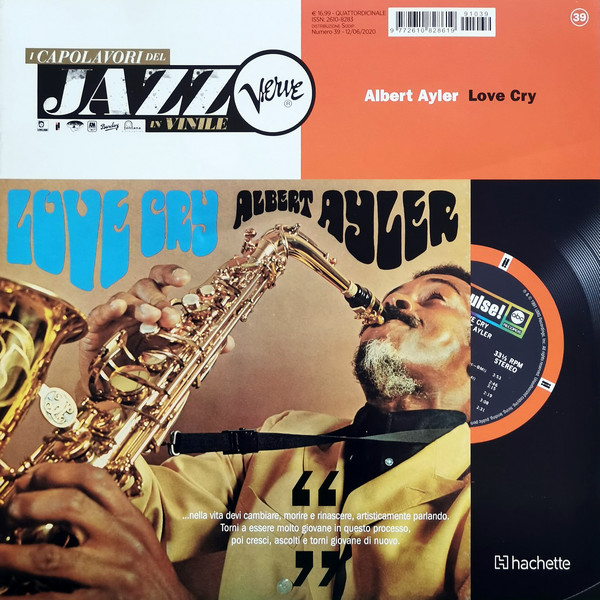 |
||||||||||||||
|
If you want to know which other albums are on the list (all taken from the Verve/Impulse catalogue) here’s a pdf. And more information is available here. Thanks to Dirk Goedeking for letting me know about this. * More from Lovebeast Steve Tintweiss unearthed a programme from Albert Ayler’s concert at the Village Theatre on 26th August, 1966 and posted it on facebook. The concert was part of ‘The Avant-Garde: A Perspective In Revolution’ series, promoted by Lovebeast Enterprises. There’s also a partial review with a photo of the Frank Smith Sextet (with Mr. Tintweiss on bass). Click the little pictures below and all will be revealed. And remember, The animal loves you, wear it in your eyes... |
||||||||||||||
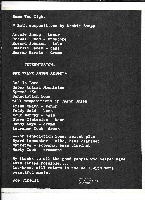 |
||||||||||||||
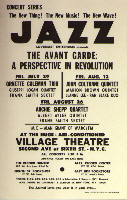 |
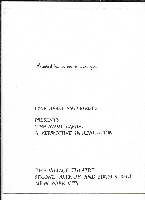 |
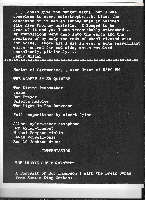 |
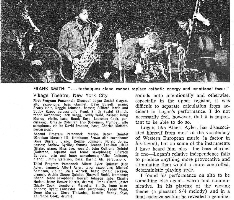 |
|||||||||||
|
At the movies At the first event in the series, Ornette Coleman and Frank Smith were on the bill with Giuseppi Logan (see the partial review above), who passed away in April, a victim of the coronavirus. The other week I was watching a documentary on the Sky Arts channel, The Devil’s Horn, in which Giuseppi Logan appears. It's not a new film (2016), but I just thought I'd mention it. The link between the saxophone and the devil is a little tenuous - I've always assumed he plays the ukulele, or perhaps the kazoo - but it's a neat hook on which to hang a film and pepper it with weird old scratchy film footage of witches and demons. Aside from the two sequences featuring Giuseppi Logan (which are, frankly, quite sad), the film also features Jimmy Heath, Colin Stetson playing bass saxophone with the circular breathing technique, Vernard Johnson (which I guess is the only connection with Albert Ayler (not mentioned) since he's a saxophonist/preacher in a Baptist church (which starts off well, but gets a bit 'Unexplained Mysteries' when he points to a damp stain on the wall of his church and asks us to see the face of Jesus), and loads of other stuff. Anyway, it's on youtube, so, if you're interested in saxophones or the devil, you can watch it there. Also on youtube is a short film from 1959, which features the music of Sun Ra, The Cry of Jazz. Now, I’m sure I’ve mentioned this before, but I can’t find it. Youtube says it appeared last month, so maybe I dreamt it. By the way, I meant to say in the June update that this site has been online for 20 years. I forgot. So, if you catch me repeating myself anytime, please accept this apology. Here’s some people talking about jazz in 1959: |
||||||||||||||
|
Man With Big Record Collection |
||||||||||||||
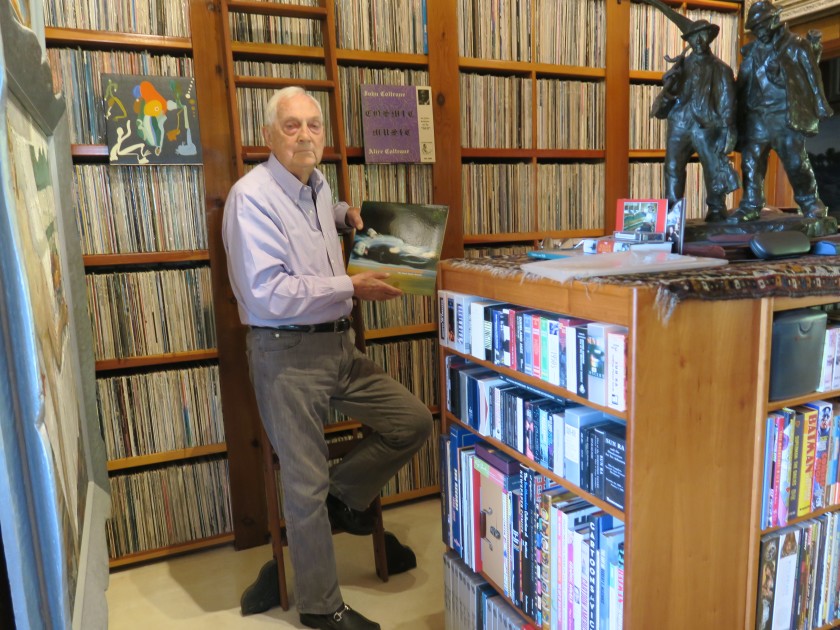 |
|
“Bram Dijkstra is shown with some of his nearly 50,000 albums. He is donating his entire collection to San Diego State University as The John Coltrane Memorial Black Music Archives. (Photo by Sandra Dijkstra).” This is from an article in the Del Mar Times and I mention it for three reasons: * More from youtube A short clip of Diamanda Galás singing Ayler’s ‘Angels’ at Barcelona in October, 2016. Dan Phillips playing ‘The Wizard’ on guitar. And, Gérard Rouy looks back half a century to Nuits de la Fondation Maeght.
|
|||||||||
|
More from South Africa In June’s update I mentioned a South African saxophonist, Harold Jefta, who played with Ayler at the Klubb Frid och Fröjd in Sweden in 1962. I’ve now come across another South African connection to Albert, in this article about the South African drummer, Gilbert Louis Matthews, who sadly died on 25th June this year. Although he never played with Albert Ayler, he did have an influential group in South Africa called ‘Spirits Rejoice’, named after the Ayler album (and available on youtube). I especially liked one quote in the article: It’s like a game... We play anything that is in our heads and later rearrange it into a meaningful tune. At first, it sounds like some mad musicians just making noise with their instruments. Then, later, we remove the noise, and all we are left with is music. Reminded me of the music we used to play in the 70s . . . if you omit the last sentence. * Oh Henry! The late and much missed Henry Grimes has a new single out. ‘Oh Henry!’ is taken from the Sparkle Division album, To Feel Embraced. Described thus on the Resident Advisor site: ‘“Oh Henry!,” one of the first two singles off To Feel Embraced, is a groundbreaking piece of music. Basinski picks up the saxophone while Henry Grimes—the late bassist who played on legendary records from the likes of Albert Ayler, Pharoah Sanders and Cecil Taylor—plays bass and violin. The track revolves around a bittersweet piano theme which is paired with blistering, footwork-style drums. “Oh Henry!” feels in line with some of the dreamiest DJ Rashad tracks. Basinski and Grimes solo wildly while contributing to the piece’s unique stillness. Grimes, the Juilliard-trained free jazz legend has no problem throwing down at 160 BPM. If you saw it live, you’d be stunned. Then you might laugh.’ |
|||||||||
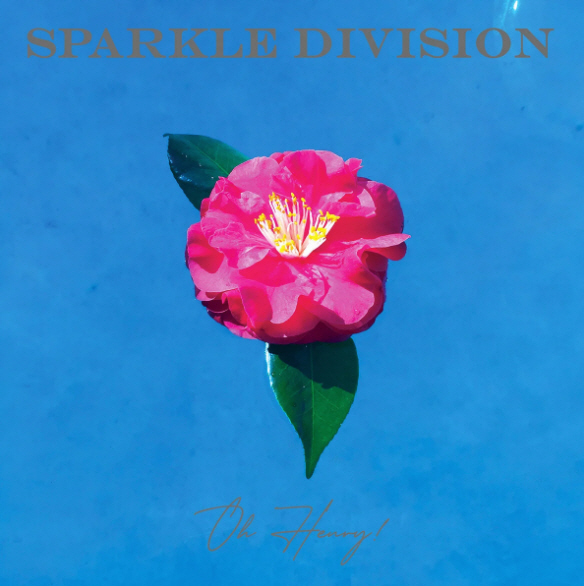 |
|||||||||
|
Kasper Collin Hits The Big Time I think this must be the first time I’ve linked to the Forbes site, but at the end of June, there was an article about the Academy of Motion Picture Arts and Sciences announcing that it had invited 819 artists and executives “who have distinguished themselves by their contributions to theatrical motion pictures” to join the organization. Among the 819 was Kasper Collin, director of I Called Him Morgan, and My Name Is Albert Ayler. Congratulations! I also spotted Udo Kier - so expect some trouble. * Music From Home: Songs Of Catharsis Rolling Stone has a list of the above, which includes Albert Ayler’s ‘Truth Is Marching In’ from In Greenwich Village. There is an HQCD version of the album on amazon for 30 quid, and you can get it on vinyl for 23, but Live In Greenwich Village: The Complete Impulse Recordings is only available as an mp3 download. I mention this because the other day someone asked me where you could get a CD copy of Live at Slug’s Saloon. I was surprised to find that the only CD you could get was the weird version (4 tracks) which coupled it with Peter Brötzmann’s Die Like A Dog Quartet’s 1994 album, Fragments Of Music, Life And Death Of Albert Ayler. Even the ESP site has only got a download version. Twenty years ago I had a ‘What’s Available’ page on this site where I monitored which Ayler albums were readily available in a selection of internet stores. I would update it monthly, but things changed, ebay and amazon marketplace became more prominent, some of the stores disappeared, so I let it go. The page is still there, but I only update it sporadically. In fact the last time was May, 2016. So, I thought I should have a look round and do a new update. Which I did, but it makes for dispiriting reading. I know downloads are the present (I won’t say the future) and CDs are getting to be the past. But I still like having something solid on a shelf, with a picture and some writing, even though the writing may be too small to see with the naked eye. * This is from Dirk Goedeking: “The world is still waiting for an Albert Ayler Museum. Here are two posters from the inauguration on 20/21 June. Sadly just a virtual art project. But at least one of the posters managed to escape onto the streets.” |
|||||||||
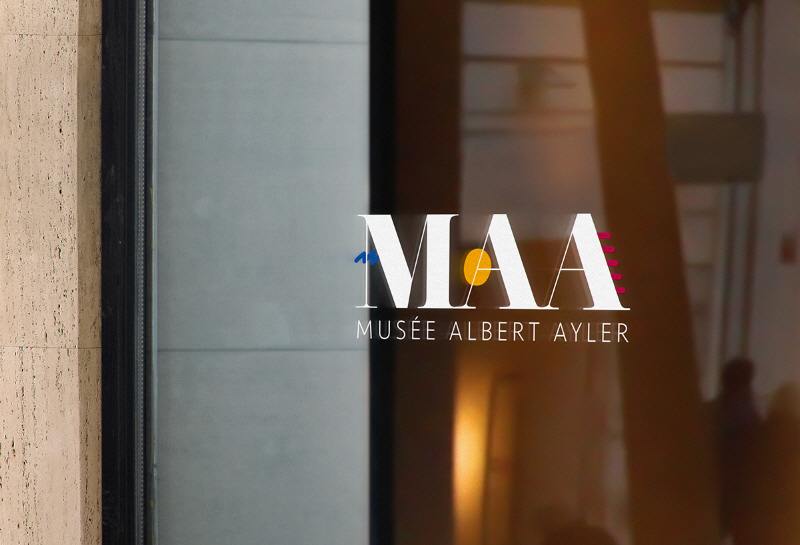 |
|||||||||
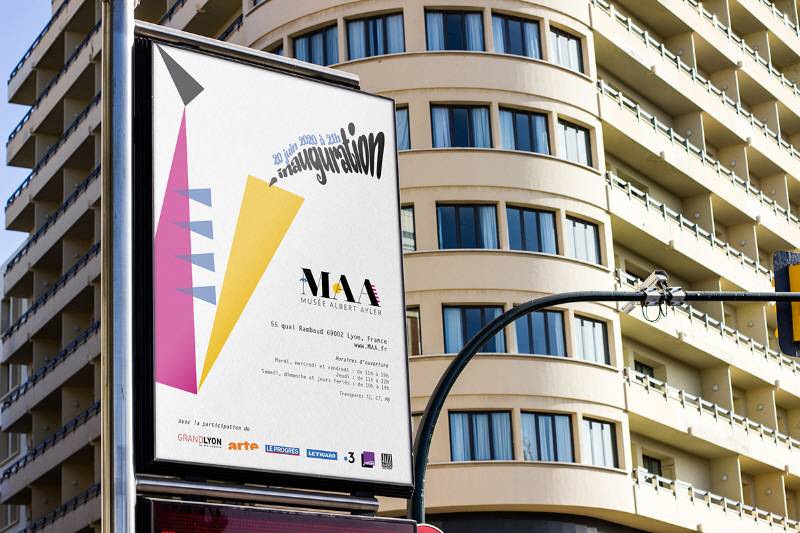 |
|||||||||
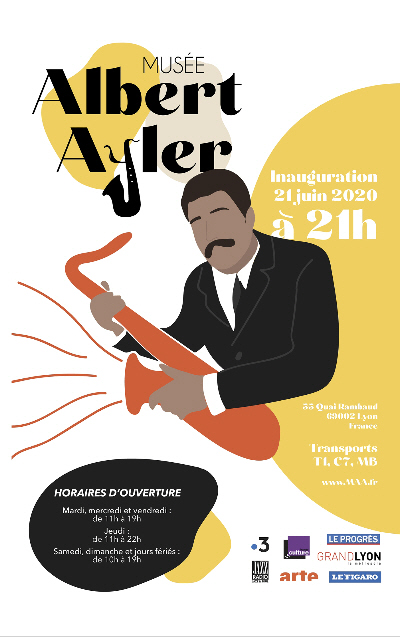 |
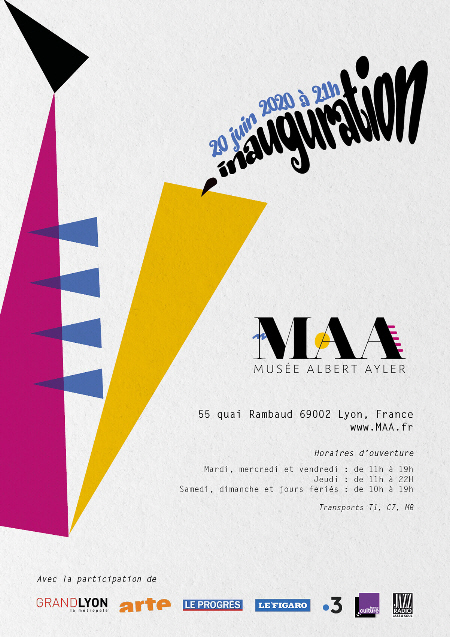 |
||||||||
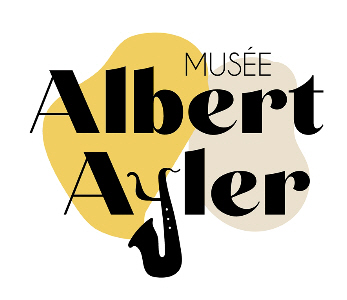 |
|||||||||
|
*** News from 2004 (January - June) 2004 (July - December) 2005 (January - May) 2005 (June - December) 2010 (January - June) 2010 (July - December) 2011 (January - May) 2011 (June - September) 2011 (October - December) 2012 (January - May) 2012 (June - December) 2013 (January - June) 2013 (July - September) 2013 (October - December) 2014 (January - June) 2014 (July - December) 2015 (January - May) 2015 (June - August) 2015 (September - December) 2016 (January - March) 2016 (April - June) 2016 (July - August) 2016 (September - December) 2017 (January - May) 2017 (June - September) 2017 (October - December) 2018 (January - May) 2018 (June - September) 2018 (October - December) 2019 (January - May) 2019 (June - September) 2019 (October - December) 2020 (January - April) 2020 (September - December) 2021 (January - March) 2021 (April - July) 2021 (August - December) 2022 (January - April) 2022 (May - August) 2022 (September - December) 2023 (January - March) 2023 (April - June) 2023 (July - September) 2023 (October - December) 2024 (January - March) 2024 (April - June) 2024 (July - September) 2024 (October - December)
|
|
Home Biography Discography The Music Archives Links What’s New Site Search
|




